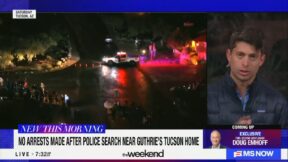Kaitlan Collins Asks Netanyahu Adviser SIX TIMES How Many Palestinians Were Killed in Strike on Refugee Camp
CNN’s Kaitlan Collins grilled a senior adviser to Israeli Prime Minister Benjamin Netanyahu by repeatedly asking him how many Palestinian civilians were killed in two air strikes on the same refugee camp.
The Israeli government confirmed on Wednesday they struck the Jabalya refugee camp for a second time in as many days. Israel has been carrying out strikes on Gaza since the Oct. 7, terrorist attacks in which Hamas militants killed 1,400 Israelis and abducted more than 200.
As its military campaign proceeds, Palestinian civilian casualties have been mounting. The Ministry of Health in Gaza claims 8,000 have been killed, though Israel disputes this.
Appearing on The Source, Mark Regev, an adviser to Netanyahu and former ambassador, fielded questions from Collins. Over the span of five minutes, he got the same question – about civilian casualties in the refugee camp – six times.
“Why did Israel strike again here?” she asked. “And do you know how many civilians have been killed in this area as a result of these strikes yesterday and today?”
Regev responded by claiming the strike took out a “senior Hamas commander who was directly involved in the massacre of October 7th.” He went on to recount the grisly details of the terror attacks and said Israel had “meted out very, very speedy justice with this individual.”
He did not address Collins’ question about casualties.
“But to the question of why did Israel strike a second time today, and do you have an estimate of how many civilians were killed as a result of these strikes yesterday and today?” she asked.
“So, I can’t tell you,” he responded. “I know that we’ve hit senior Hamas commanders, and we’ve hit many Hamas terrorists. That’s our goal.”
“Ok, but you’re not acknowledging how many,” the host said. “I assume Israel does have an estimate of how many civilians were killed. I assume you have an estimate of how many civilians are there when you make a calculus on when to strike. Tell me if that’s wrong. But when you decide on striking military targets, that you say are military targets but are also where civilians are – I mean, how many civilian deaths does Israel believe are acceptable in an air strike if it is a military target?”
Regev replied that they are trying “to keep collateral damage to a minimum.”
“But you know how many were killed?” Collins inquired again.
“I can’t tell you exactly ’cause I don’t know,” he said.
“What about an estimate?” she followed up.
“Of course, the numbers that come out from the Hamas-controlled Ministry of Health are of course high, but we don’t believe them,” he answered.
“So what number do you believe?” she persisted. “You don’t believe their number. I obviously understand why. It’s controlled by Hamas that’s putting out these figures. But what number– I haven’t heard a number from Israel. What number do you think?”
“We can’t give you a precise number, and I don’t want to give a number irresponsibly,” Regev stated. “I can say the following. Most of the civilians left that location before we struck. I’m not denying there are a few there. But we’ve hit a primary Hamas target. We’ve taken out a Hamas leader. We’ve taken out many, many Hamas fighters. That was the goal of our operation.”
He added that Israel warned Palestinians in northern Gaza to move south.
“I will say, Ambassador, a lot of them feel like they don’t have places to go,” Collins replied. “Certainly, not safe places.”
Watch above via CNN.
New: The Mediaite One-Sheet "Newsletter of Newsletters"
Your daily summary and analysis of what the many, many media newsletters are saying and reporting. Subscribe now!






Comments
↓ Scroll down for comments ↓